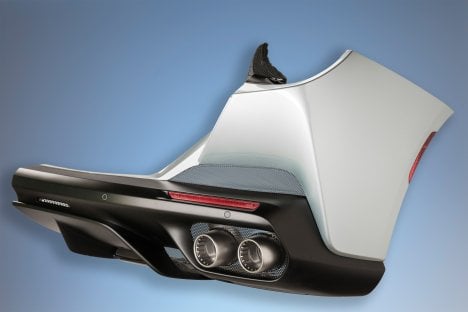In a joint project, BASF and STR Automotive have succeeded for the very first time in using the new Elastolit R 8819 Lightweight material for the mass production of premium components. Compared with conventional production using PU-RRIM materials, this new process offers a significant weight reduction. The usual component thickness of 3 mm can be reduced to less than 2.5 mm without affecting processing, quality or even mechanical properties.
A high-modulus PU material
The front and rear bumpers of cars produced in small batches are usually manufactured using short-fibre-reinforced polyurethane (PU-RRIM) systems with a thickness of 3 mm. Attempts to lighten the bumper by reducing the thickness of the component or by using a special filling combined with a reduction in material density have failed, as their mechanical properties (strength, rigidity, strength and impact resistance) have proved insufficient. The process also failed the climatic test.
Discussions between BASF and STR Automotive resulted in a technical solution based on a classic high-modulus PU material with high temperature resistance, rigidity and impact strength.
"The improved matrix performance of the material allows the designer to create a much thinner component, without compromising on quality," explains Jürgen Schneider of the Technical Development department at BASF Polyurethanes GmbH in Lemförde. Depending on requirements and applications, Elastolit R 8819 Lightweight can be combined with different fillers: standard mineral fiber for components such as rear bumpers, a combination of carbon fiber and mineral fiber for vertical elements with low coefficients of thermal expansion (e.g. side panels), or a combination of carbon fiber and lightweight hollow glass spheres for elements where weight reduction is a priority.
Close collaboration
"Close cooperation with STR Automotive was one of the decisive factors in the successful launch of this new product. Thanks to this innovation specialist, we benefit from a partner who supports the development of materials at an advanced stage for existing components, and has contributed its expertise in the manufacture and production of these," says Giuseppe Monaco, Key Account Manager of BASF Italia S.p.A.'s Performance Materials division.
For the first series of elements made from Elastolit R 8819 Lightweight, weight has already been reduced by 600 g per m2. For rear panels, this translates into a weight reduction of up to 1.5 kg. Massimo Cecchini, CEO of STR Automotive, founded in 2002, is delighted with these results. "With this new material and compatible load options, we have a good range of tools that enable us to satisfy different requirements. For our customers, it's important to obtain high-quality components. Lightweighting must not be at the expense of quality, and the price-performance ratio must also be balanced," he explains.
A new material to lighten vehicle components
